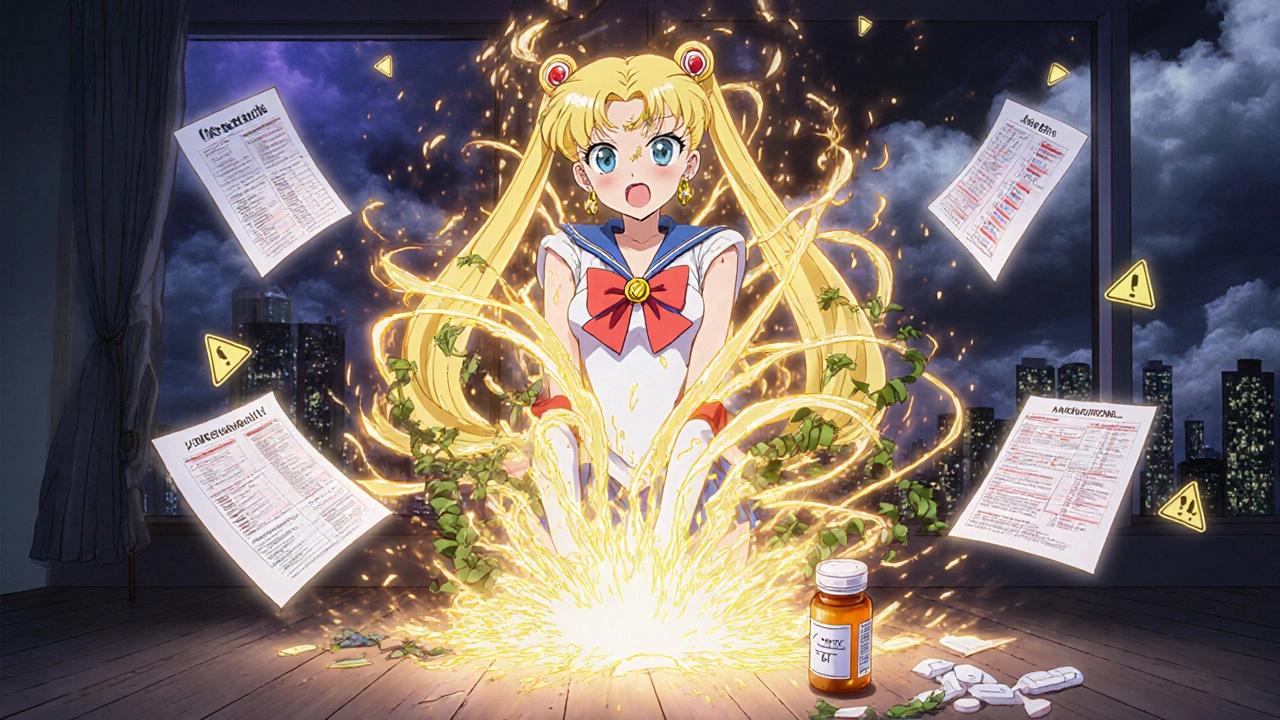Thyroid Medication & Ashwagandha Risk Calculator
Thyroid Health Calculator
This tool estimates the potential risk of thyroid hormone over-replacement when combining ashwagandha with thyroid medication. Based on clinical studies showing ashwagandha can increase T4 levels by up to 19.6% at 600mg daily.
Risk Assessment Results
When you're managing hypothyroidism with levothyroxine, your body is on a tightrope. Too little hormone, and you feel tired, cold, and sluggish. Too much, and your heart races, you lose weight without trying, and sleep becomes impossible. Now imagine adding a popular herbal supplement like ashwagandha into the mix - something marketed as a natural stress reliever, but with hidden power to push your thyroid hormone levels dangerously high.
What Ashwagandha Actually Does to Your Thyroid
Ashwagandha isn't just another herb. It's a potent adaptogen that directly affects your endocrine system. Studies show it can raise your thyroid hormone levels - not slightly, but significantly. In a controlled 2018 trial with 50 people with subclinical hypothyroidism, taking 600 mg of standardized ashwagandha daily for eight weeks led to a 41.5% increase in T3 and a 19.6% rise in T4. That’s not a minor nudge. That’s enough to push someone from borderline low into the hyperthyroid range - especially if they’re already on thyroid medication. The active compounds in ashwagandha, called withanolides (especially withaferin A and withanolide D), appear to stimulate the hypothalamic-pituitary-thyroid (HPT) axis. In simple terms, it tells your body to produce more thyroid hormone. For someone without a thyroid condition, that might sound helpful. But for someone on levothyroxine, Synthroid, or another thyroid hormone replacement, it’s like turning up the volume on an amplifier that’s already at max.The Real Danger: Over-Replacement
Over-replacement means your body gets too much thyroid hormone. It’s not a myth. It’s documented. The American Association of Clinical Endocrinologists (AACE) reported 12 confirmed cases of thyrotoxicosis - a dangerous condition where thyroid hormone levels spike - directly linked to patients taking ashwagandha along with their thyroid meds. In those cases, T4 levels soared above 25 mcg/dL. The normal range? 4.5 to 12.0 mcg/dL. TSH, the hormone your pituitary releases to signal the thyroid, dropped below 0.01 mIU/L. Normal is 0.4 to 4.0. When TSH hits zero, your body is screaming that it’s flooded with thyroid hormone. Patients aren’t just getting lab results that look bad - they’re ending up in the ER. A 2022 survey by the American Thyroid Association found that nearly 1 in 5 people taking ashwagandha while on thyroid medication experienced symptoms of hyperthyroidism. Twenty-nine of them needed hospitalization for heart rhythm problems. One user on the Thyroid Help Forum reported their TSH plummeted from 1.8 to 0.08 after just six weeks of combining 500 mg of ashwagandha with 100 mcg of levothyroxine. They developed palpitations and insomnia. Their doctor had to slash their medication dose.Why the Risk Is So High
The problem isn’t just the herb itself. It’s what’s in the bottle. The FDA doesn’t regulate supplements like ashwagandha for purity, potency, or consistency. A 2021 test by ConsumerLab.com found that the same 500 mg dose of ashwagandha from different brands contained anywhere from 1.2% to 7.8% withanolides. That’s a six-fold difference in active ingredients. One bottle might be mild. Another could be a thyroid bomb. Even if you buy a “standardized” product, there’s no guarantee it matches the label. And because the dose you take isn’t precise, your doctor can’t adjust your medication safely. Levothyroxine is dosed in micrograms - exact, calibrated, and tested. Ashwagandha? It’s a wild card.
What Doctors Are Saying
Endocrinologists are united on this: avoid ashwagandha if you’re on thyroid medication. Dr. Angela Leung from UCLA’s Endocrine Clinic says it can “tip the delicate balance” of hormone replacement, leading to iatrogenic hyperthyroidism - meaning the treatment itself causes the problem. Dr. Mary Hardy at Cedars-Sinai acknowledges ashwagandha may help people with untreated hypothyroidism, but stresses: “The therapeutic window for thyroid medication adjustment is narrow. Adding an unregulated herb creates unacceptable risks.” The Endocrine Society’s 2023 clinical guidance is blunt: patients on levothyroxine, liothyronine, or antithyroid drugs should avoid ashwagandha entirely unless under strict medical supervision with biweekly blood tests. Even then, they warn the risk-benefit ratio doesn’t favor use.What About the People Who Say It Helped?
Yes, some people report feeling better on ashwagandha alone. On Reddit’s r/Thyroid community, one user said their T4 rose from 5.2 to 8.7 mcg/dL over three months without medication. That sounds promising - until you realize they were never diagnosed or treated. Their levels were still low-normal. What they experienced wasn’t a cure. It was a temporary bump. And without ongoing monitoring, they could have slipped into hyperthyroidism without knowing it. The FDA’s adverse event database recorded 47 cases of thyroid dysfunction tied to ashwagandha between 2019 and 2022. Thirty-two of those involved people already on thyroid meds. That’s not coincidence. That’s a pattern.What You Should Do
If you’re on thyroid medication and thinking about trying ashwagandha, stop. Talk to your doctor first. Don’t assume it’s safe because it’s “natural.” Natural doesn’t mean harmless - especially when it interacts with precise, life-sustaining medications. If you’re already taking it:- Stop immediately and tell your doctor.
- Get your thyroid levels tested - TSH, free T4, free T3 - within 2 to 4 weeks after stopping.
- Be aware that ashwagandha’s effects can linger for 2 to 3 weeks after you quit. Its half-life is about 12 days. Your body doesn’t clear it overnight.
- Don’t restart it without a clear plan from your endocrinologist.

Alternatives for Stress and Sleep
If you’re using ashwagandha for stress, anxiety, or sleep, there are safer options that won’t interfere with your thyroid meds:- Magnesium glycinate - shown to improve sleep quality and reduce anxiety without affecting thyroid hormones.
- L-theanine - an amino acid in green tea that promotes calm without sedation.
- Good sleep hygiene - consistent bedtime, no screens before bed, cool room temperature.
- Cognitive behavioral therapy for insomnia (CBT-I) - proven to be more effective long-term than supplements.
The Bigger Picture
Ashwagandha is part of a $7.2 billion global adaptogen market. About 23% of users take it for thyroid support. But the Dietary Supplement Health and Education Act of 1994 lets companies sell it without proving it’s safe or effective. The FDA has issued 12 warning letters to manufacturers for making false thyroid claims - but enforcement is weak. The European Medicines Agency now requires ashwagandha products sold in the EU to carry explicit warnings about thyroid medication interactions. The U.S. is lagging. The American Medical Association has asked the FDA to require black box warnings - the strongest kind - but the supplement industry is pushing back. Meanwhile, the NIH is funding a $2.3 million study tracking 300 patients on thyroid meds who take ashwagandha. Results aren’t due until late 2024. Until then, the evidence we have is clear: combining these two is risky.Final Thought
Your thyroid medication isn’t optional. It’s keeping you alive and well. Ashwagandha might feel like a gentle boost, but it’s a powerful player in your endocrine system. You wouldn’t mix it with chemotherapy or blood thinners. Don’t mix it with your thyroid meds either. Your body doesn’t need more stress - from herbs or from uncontrolled hormone levels.Can ashwagandha replace my thyroid medication?
No. Ashwagandha is not a substitute for thyroid medication. While it may raise thyroid hormone levels in some people, it does so unpredictably and without medical oversight. Thyroid medication like levothyroxine is precisely dosed based on blood tests and individual needs. Relying on ashwagandha alone can lead to under-treatment, worsening symptoms, or even heart damage over time.
How long should I wait after stopping ashwagandha before getting my thyroid tested?
Wait at least 30 days. Ashwagandha has a half-life of about 12 days, meaning it takes 2 to 3 weeks for your body to fully clear it. Testing too soon can give false results - your TSH and T4 levels may still be elevated even after you’ve stopped taking it. Your doctor needs an accurate baseline to adjust your medication properly.
Is it safe to take ashwagandha if I don’t have a thyroid condition?
It may be safer, but not risk-free. Even if you don’t have hypothyroidism, ashwagandha can still raise your thyroid hormone levels. This could lead to subclinical hyperthyroidism - a state where you feel fine now but develop heart issues, bone loss, or anxiety over time. Always consult a doctor before starting any supplement, especially one with known endocrine effects.
Can I take ashwagandha at a different time of day than my thyroid medication to avoid interaction?
Some doctors suggest waiting 4 hours between doses, but there’s no solid evidence this prevents interaction. Ashwagandha works systemically - it doesn’t just affect your gut. Once absorbed, its compounds circulate in your bloodstream and influence your thyroid axis for days. Separating doses won’t eliminate the risk. The safest approach is to avoid combining them entirely.
Are there any supplements that are safe to take with thyroid medication?
Yes. Magnesium glycinate, vitamin D, selenium (in moderate doses), and L-theanine are generally considered safe and don’t interfere with thyroid hormone absorption or function. Iron and calcium supplements can interfere with levothyroxine absorption, so take them at least 4 hours apart. Always check with your doctor before starting any new supplement, even if it’s labeled “safe.”


Alex Harrison
November 7, 2025 AT 23:57I took ashwagandha for three months thinking it would help my fatigue and ended up with heart palpitations and insomnia. My TSH dropped to 0.12. I didn't connect the dots until my endo pulled up my lab history and asked if I'd been taking supplements. Turns out I wasn't alone. Stopped it cold and my numbers normalized in six weeks. Don't let anyone tell you it's harmless just because it's natural.
Jay Wallace
November 9, 2025 AT 06:46Of course the FDA doesn't regulate this stuff-because America's too busy chasing ‘natural’ snake oil to care about science. In Europe they put warnings on the bottle. Here? You get a cute little bag with a smiling root and a ‘boost your zen’ slogan. It's criminal. People are ending up in the ER because they think ‘herbal’ means ‘safe.’
Alyssa Fisher
November 9, 2025 AT 13:09It's fascinating how we treat pharmaceuticals with surgical precision but give herbal supplements a free pass. Levothyroxine is dosed in micrograms, calibrated to individual metabolism, monitored through blood tests. Ashwagandha? A random powder in a capsule with no standardization, no accountability. We're essentially letting people play Russian roulette with their endocrine system because it’s ‘natural.’ The real question isn't whether it works-it's why we let this happen at all.
Alyssa Salazar
November 11, 2025 AT 05:42Let’s be real-the endocrine system isn’t some toy you can tweak with Instagram-approved powders. Ashwagandha’s withanolides are bioactive compounds that modulate HPT axis signaling. That’s not ‘support,’ that’s pharmacological intervention. And when you’re already on exogenous T4, you’re stacking unregulated phytochemicals on top of a tightly controlled hormonal cascade. This isn’t anecdote territory-it’s endocrinology 101. If you’re on levothyroxine and you’re still popping adaptogens, you’re not being proactive-you’re being reckless.
Beth Banham
November 12, 2025 AT 06:06I used to take it for sleep. Didn’t realize it was messing with my thyroid until I started sweating through my sheets at 3 a.m. I stopped cold, called my doctor, and got tested. Everything normalized. Just wanted to say-I’m glad someone finally laid this out clearly. No judgment, just real talk.
Brierly Davis
November 13, 2025 AT 18:58Hey, if you’re on thyroid meds and thinking about trying ashwagandha-just pause. Seriously. Talk to your doc first. There are so many safer ways to handle stress and sleep-magnesium, L-theanine, sleep hygiene. You don’t need to risk your thyroid balance for a placebo effect. Your body’s already doing enough. Be gentle with it.
Amber O'Sullivan
November 15, 2025 AT 07:59My sister took ashwagandha and ended up in the hospital with atrial fibrillation. They had to adjust her Synthroid dose and she still has tremors six months later. People don't get it. Natural doesn't mean safe. Stop pretending it's just a tea
Jim Oliver
November 15, 2025 AT 12:29Of course someone’s going to say ‘it helped me.’ You’re not a controlled trial. You’re a single data point with confirmation bias and a TikTok account. The fact that you think your anecdote overrides peer-reviewed studies and clinical guidelines is the real problem.
William Priest
November 17, 2025 AT 01:59Adaptogens? More like adapt-o-tricks. The supplement industry’s entire business model is built on exploiting people’s fear of pharma. ‘Natural’ is just a marketing term for ‘untested and unregulated.’ You wouldn’t take random pills from a street vendor-why trust a bottle labeled ‘ashwagandha’ from a company that doesn’t even list the withanolide content?
Ryan Masuga
November 18, 2025 AT 23:15Big thanks to the OP for laying this out so clearly. I’ve been telling my clients for years-just because it’s in a health food store doesn’t mean it’s safe with meds. Magnesium glycinate and L-theanine are your new best friends. And yeah, CBT-I works better than any herb. You got this.